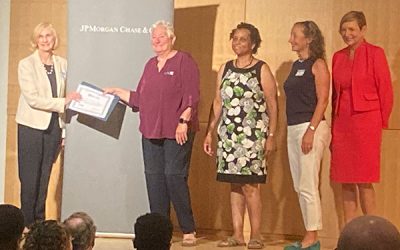WCC Leads Way With Financial Education Program for Students
News Based on facts, either observed and verified directly by the reporter, or reported and verified from knowledgeable sources.

By Em Stangarone
As Americans face record-breaking inflation, widespread debt and the consequences of income inequality, financial literacy and management become crucial to an individual’s ability to survive and thrive. To help students feel more at ease with their finances, Westchester Community College (WCC) has received a $450,000 grant to continue its Money Smart Forum (MSF) financial coaching program for three more years.
The grant is part of a $2.5 million investment by JPMorgan Chase and managed by the National Council for Workforce Education to create and implement financial coaching programs at seven additional community colleges based on WCC’s successful model.
Last Thursday afternoon, WCC held a kickoff event to celebrate the program’s success and announce the next three colleges selected for grants: Mott Community College in Flint, Mich., SUNY Fulton-Montgomery Community College in Johnstown, N.Y. and SUNY Rockland Community College in Suffern.
Personnel from the three colleges will start their training this month to learn how to launch their own financial coaching programs. Four additional colleges will be selected for grants in 2023.
During last week’s event, WCC President Belinda Miles spoke of how access to financial literacy and coaching has been a boon to many students. She cited statistics revealing that 4 in 7 Americans are financially illiterate.
“It’s one thing to have the knowledge, it’s another thing to get in there and do it,” Miles said. “Those lessons stay with you, and if you continue that behavior, it can really bear fruit later on.”
The Money Smart Forum financial coaching program at WCC started in 2014 and has since helped more than 1,000 students. Interested students sign up, and if accepted to the program, have one-on-one 30-minute meetings every other week with an assigned financial coach to create and achieve goals that address their individual financial needs. The program, which is in addition to a student’s regular schedule of classes, also offers workshops on various financial wellness topics twice a month.
Students who go through the program learn how to save, budget, build credit, manage debt and plan for their future. Through coaching and education, the program has helped improve student academic performance and career readiness, increase graduation rates and promote lifelong financial health.
There are still many obstacles to financial literacy, including a nationwide lack of personal financial education in schools, said Suzanne Matthews, education director at WCC’s Center for Financial and Economic Education. Many students don’t know how to save, open a bank account or manage a budget. Financial literacy skills can help them manage their money better now and prepare them for unexpected expenses that may arise in the future, Matthews said.
Several speakers at the event also noted how lack of financial knowledge disproportionately affects women, first-generation Americans, the economically disadvantaged, and racial minorities. Equipping students with financial know-how helps with economic mobility and closes the racial wealth gap.
“One of the biggest changes is that students feel empowered to manage their money,” Matthews said of the program’s participants.
One such student is Sarah Kadish, who shared her story at Thursday’s event. Kadish said she left a 30-year career in clerical work to return to school and pursue a degree in marketing to help her realize her dream of opening her own greeting card company.
Before participating in the Money Smart Forum program, Kadish said she “lived in fear of money,” juggling too many credit cards while getting by on a fixed income. Now, after working with her financial coach, Marisa DiBenigno, she has taken control over her finances, raised her credit score by 30 points and is looking forward to saving and investing money in her business.
“The most important thing I learned from MSF was that I have choices about what I do with my money, and that has completely liberated me,” Kadish said. “I am so excited, due to this program and Marisa’s diligent coaching, to say that I really think I can achieve my dream, and very creatively so.”

Examiner Media – Keeping you informed with professionally-reported local news, features, and sports coverage.
